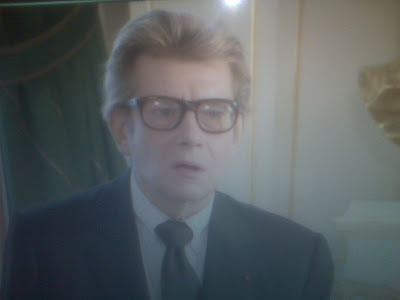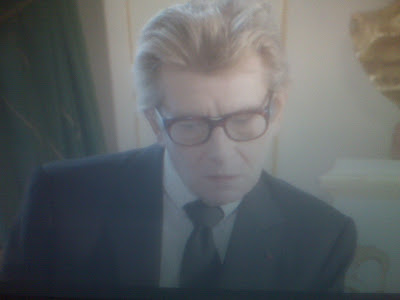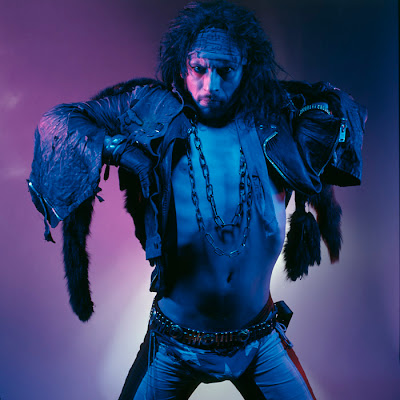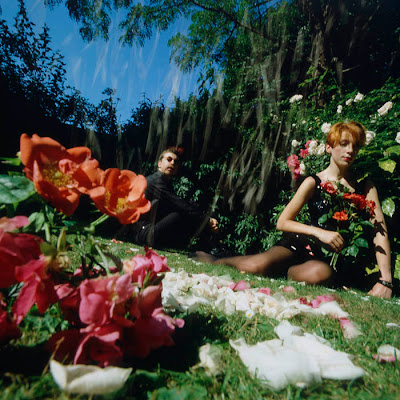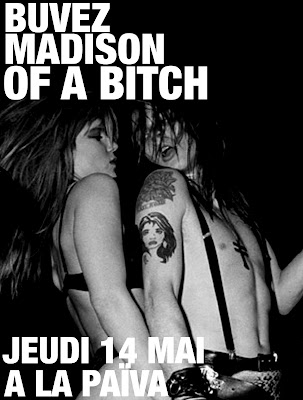
Buvez Madison a tellement aimé l'interview des PSB dans OUT que nous avons décidé de vous la proposer.
I've been lucky enough to meet and talk with some serious politicians in my time as a political journalist in Washington, D.C., and I have the jaded skepticism to prove it. I’ve hung with Obama. I’ve dined with McCain. I’ve seen the Pope. I’ve grilled a prime minister. These are privileges and perks for the purpose of my work in Washington. But the nerves and thrill I get from talking with Neil Tennant and Chris Lowe surpass them all.
Why? Because their music has been with me for my entire adult life. They have described the chapters of my gay and nongay life in the hinges of the 20th and 21st century. Unlike Papal bulls, their lyrics elude any one interpretation and, further, render the gay experience as expansively and confusingly human. The swelling brilliance of their dance anthems always comes undercut with a drop shadow of pain and loss, working through and beyond the grief of the plague to the work ethic of the survivors. I love them because they can write for Kylie Minogue and champion Dusty Springfield even as they write a score for Eisenstein’s Battleship Potemkin for the Dresden Symphony Orchestra. I love them because no man sings as a woman as well as Neil Tennant; because no techno master is as unashamed of disco or as contemptuous of rock ‘n’ roll as Chris Lowe; because they have written the simplest song about gay love, “Nervously,” and the most wrenching account of gay death, “Your Funny Uncle.”
Their music is about big things -- Casanova and Catholicism, terror and religion, politics and pretension -- but it is guided by an intelligence that doesn’t balk at fun. They have never put out an album, or even a single, without an intense and exquisite sense of design, nor have they bent themselves to their retrograde time. Because they have seduced fame without being seduced by it, they need celebrity less than pop music needs them, and less than we do.
In America -- where pop and vacuousness are often synonyms -- the Pet Shop Boys have been a very well-kept secret for the last decade or so. There are those here who think the last song the Pet Shop Boys recorded was in 1986, but there are also those, like me, who have devoured every B-side every year for the past 20 and sense that their best work still lies ahead. In the yap and yammer of contemporary culture, there are so many pop confections in search of a market, so much soulless music chasing mindless lyrics, immune to history and thought and wit and the energy that comes from something more than restlessness.
The Pet Shop Boys are different. Yes, actually, they are.
Andrew Sullivan: a misconception people seem to have is that you are trapped in ’80s synth-pop -- not that there’s anything wrong with that.
Neil Tennant: We love it.
I love it too. But for more than 20 years now, you’ve been the ever-changing soundtrack of many lives. Am I over-reading this, or do you think of the arc of your work as covering a distinct period of history?
NT: I do, actually. The Pet Shop Boys’ 10 albums are a sort of social history, from “Let’s Make Lots of Money” to “Love Etc.” They’re both sort of bookends of the “market is the only thing that counts” money culture, which we’ve had for over 25 years. And that’s deliberate. One of the things we do is comment on what’s going on, normally in a satirical or ironic or funny way.
Chris Lowe: I think we’re one of the few groups who does humor intentionally.
The funniest thing I’ve ever heard, actually, is your cover of u2’s “Where the Streets Have No Name.”
CL: That’s not meant to be funny. [Laughs]
Within your music, also, there is the arc of the AIDS epidemic.
NT: There are a lot of songs about the AIDS epidemic.
I guess it started with “It Couldn’t Happen Here,” right?
NT: My best friend was diagnosed with AIDS in 1986, and that song is a description of a conversation we had. I remembered him saying in the very early days that AIDS was not going to happen in Britain for various reasons. And we were being a bit complacent about it.
Is it his funeral in “Your Funny Uncle?”
NT: Yes, and it’s the same guy in “Being Boring.” When I grew up in Newcastle my first band was a folk group called Dust, inspired by the Incredible String Band, believe it or not, and he was the other guy in it. There were two girls as well. And then we split up due to musical differences, namely because he wanted to be the Incredible String Band and I wanted to be David Bowie, but “Being Boring” is the description of a party we had, “Your Funny Uncle” is his funeral, and “It Couldn’t Happen Here,” again, was looking back at us as teenagers.
There’s also a sense in your recent work of foreboding, of the combination, as you put it, of religion and nuclear energy. You have a fear of fundamentalist religion. But, you also have a fear of the police state.
CL: We were very annoyed about the surveillance culture.
NT: I don’t see why, when we’re walking down the Kings Road in Chelsea, I should be filmed by masses of surveillance cameras. I don’t think we should create an apparatus, which is open for, firstly, abuse, of course, but -- even more likely -- to being cocked-up by some complete moron, which is what normally happens.
It’s not the conspiracy theory of history -- it’s the cock-up theory.
NT: Oh, I’m much more of a cock-up theory person. Let’s face it. This decade has been pretty dark since 9/11. And it wasn’t really set up to be like that, was it, at the beginning?
But your songs, in a way, don’t really offer solutions.
NT: No, and they don’t intend to. Otherwise, one would be a politician.
They Do, However, offer a critique. For example, “Luna Park,” on Fundamental, is set in a fairground. Is that a metaphor for the West in this period?
NT: It’s probably America. Someone is looking at a fairground at night and all the lights and people screaming on the Big Dipper and the rifle range and all the rest of it. I mean it’s not a particularly original metaphor, but it’s about why people enjoy being scared and whether that is used politically. I think it is done politically, and I think America at that particular time -- the American president and his cohorts -- were doing it.
Although, obviously, the original terror was utterly understandable.
NT: The original terror was understandable, yes. There was a moment, at that period, when America had the moral leadership of the world and threw it away.
And Obama is a belated attempt to regain it at some level.
NT: Yeah, I think he probably is.
You have your usual skepticism.
NT: No, no, no, we love Obama. We’re crazy about Obama in Europe. We’re all Obama crazy. Everyone thinks he’s sexy. Lovely teeth, as my mother would say.
And he glides. He has a great physical fluency about him.
NT: He actually would have made a very good cardinal, that sort of gliding across St. Peter’s Square thing he does. He’s got that kind of bearing. He’s just brought back dignity, which is an amazing thing to put back on the cultural agenda. There’s a slightly corny song on our album called “More Than a Dream,” which was written when Obama was slugging it out with Hillary in the primaries, and you could feel the potential for the world to change away from the sort of paranoia -- justified as it may be -- to something different. And that spirit is what we’re riding at the moment, although of course we wrote that before the economic crisis.
There’s a buoyancy and positivity about the new album, a combination of great enthusiasm intertwined with a great sense of loss. in some ways, that’s the Lowe-Tennant combination: Loss and energy at the same time.
CL: I think that sums up the Pet Shop Boys, really. And there’s also a melancholy thrown in, with uplifting dance beats.
NT: It’s romance and realism, the ideal and the reality. Opposites have always fascinated me.
You expect it to go up, and then you suddenly feel it going down.
CL: Absolutely. If you just want to create a Pet Shop Boys sound instantly you can program some drumbeats and then play an A-minor chord over it: “Oh, God, that sounds like the Pet Shop Boys. Oh, that’s the trick, is it?”
Your music has also spoken to gay men for 20 years, which is really half the time since Stonewall. How would you think of the reality and the ideal in terms of how gay lives have shifted over that time?
NT: Well, that song you referred to earlier, “It Couldn’t Happen Here,” has a bit about someone in high heels quoting magazines. That was my experience of gay clubs when I came to London in 1973, and the gay thing in those days was all very zhuzhy. It was before clones or people dressing like skinheads or something.
Zhuzhy? Can you translate that?
NT: Zhuzhy means sort of fabulous, maybe trailing a scarf, maybe wearing nail varnish, very fashion-y, maybe with long hair that you flicked back over your shoulders. Zhuzhy. [Laughs] That’s what they used to say in London.
And then what?
NT: And then I got alienated from the gay world -- when I went through my famous heterosexual phase -- because everyone looked the same. To this day, I’ve never got the everyone-looking-the-same thing.
The Muscle Marys?
NT: Yeah, but this was the clones and the checked shirts and the 501s and the same mustaches, you know. I mean, now you can look back, and it seems sort of endearingly kitsch. It’s Tales of the City, you know -- it’s that period. I found that alienating because it seemed professional and narcissistic and just about doing sex really well. And all of that I don’t find very sexy. [Laughs]
What about leather bars?
CL: We once went to the Mineshaft, just before it closed. We went as tourists. It was empty and all a bit depressing. Just rows of empty bathtubs that had once seen better days.
The golden showers had finally stopped. Over the years, of course, the club scene has gone through various transformations. How do you keep up with that?
CL: Well, we like clubbing.
At some point is that not going to get a little old for you?
CL: I go to Ibiza every year, and I don’t have a problem going out there at all. In Berlin they take dance music very seriously. We went to a night of impenetrable dance music that was so impenetrable you couldn’t dance to it. Everyone was just standing around. I thought, Well, that’s really taken it to an extreme, hasn’t it? Just a load of intellectuals standing around chatting.
Is The transition from AIDS to marriage rights something you’ve tackled?
NT: I haven’t tackled the partnership thing, but if I did it would be satirically. It’s quite a good idea.
Have you thought of getting married?
NT: No, I haven’t. I haven’t been in a relationship where I’ve wanted to, firstly. I was in the city when they brought gay marriage in, and I said, “Well, that’s great, they’re going to invent gay divorce.” And, of course, they did.
You’re NOT really that much of a cynic, are you?
NT: You’re right -- I’m not. I do have cynical streaks, but my longing goes into music.
There’s also a Catholic defense of love in your songs, an underlying sense of humaneness that seems to be quite Catholic in its instruction.
NT: I think I get that from my parents, who became liberal Catholics. My parents, who both died in the last 12 months, had an amazing journey. My mother once apparently asked my sister, “Is Neil one of them?” And, of course, they’d read I was gay in The Sunday Times. In our family it was because we never talked about sex, let alone being gay. But they went on this amazing journey where they quite liked the fact I was gay by the end, and they didn’t mind that my sister was divorced and remarried, whereas in the 1970s they would have been appalled -- aghast beyond belief.
Have you thought about going back to the church?
NT: No. Actually, I’ve become less religious as I’ve gotten older. Even when I wrote “It’s a Sin” part of me was probably still a Catholic. But the things that I always liked about Catholicism they got rid of! I liked the Latin and the incense and the sort of music and plainsong. When I was 8 years old, I could sing the Latin mass in plainsong because I was an altar boy.
In some ways, there is nothing more Broadway than the old Catholic mass. when people ask how many gays are in the church, you say, “Well, who do you think created the vatican high mass?” it must have been some tortured queen.
NT: Particularly in the Anglican church! The irony of them having a debate about homosexuality. I always think, If we take all the homosexuals out, love, what’s going to be left? I have always liked incense, though.
Tell me why you think America is still a relatively resistant market for you. Why are you not the household name here that you have become elsewhere in the world?
CL: It’s America’s loss. [Laughs] It all started for us in America. We made “West End Girls” there [in the U.S.]. It got played for the first time, really, on KROQ in Los Angeles, and we’ve always had quite a big following in the major cities, especially. But you know, American radio sort of decided that’s it. I heard a story from one of the DJs at KROQ that the station owner or manager came in one day with a copy of New Order’s “Blue Monday,” threw it onto the desk, and said, “We’re never playing this again.”
And that’s kind of how America works.
NT: I think in America we are filed under ’80s. The Pet Shop Boys career in America goes from 1986 to 1988, and in fact we have a string of hits at that point, and we’re always on the radio, and then suddenly, weirdly, with the song “Left to My Own Devices,” it was all over. It happened like that. No one has ever explained to me why that happened, but I just thought, They’ve had enough of us. [Laughs] I didn’t really blame them. But what we liked was going back to being a cult thing, where we’ve remained, very loyally in America, ever since.
It’s a Diverse cult. I’m amazed at how many nebbishy middle-aged Jewish guys are obsessed with you. When I went to the Pet Shop Boys concert here in Washington there were grannies, baby-boomer hippies, and gay men, and then sort of sensitive young twinks, all of whom were singing their hearts out. What does that tell you about America?
NT: We love it. We’ve maintained that the Pet Shop Boys are always an alternative to what’s going on. It’s 1992, it’s all about Nirvana, but there’s still the Pet Shop Boys. It’s 2009, it’s all about the Pussycat Dolls or something, but there’s still the Pet Shop Boys. And I imagine that people in America hear a song of ours and think, Oh, the Pet Shop Boys, and they buy a song and suddenly find themselves drawn into the world of the Pet Shop Boys and the records with their one-word titles and their designs and their videos and the recordings with Liza Minnelli and Dusty Springfield and the remixes by Madonna. It’s a way of not really competing -- and it’s why I’m not really bothered about success in America because we really try to exist in our world. We do things our own way and, generally speaking, it’s been the hard way.
Hard, but consistent. You can take an album from the very beginning and the very end and see clear parallels between them. It feels like it came freshly minted, and it keeps coming out in the same way.
Cl: The way we write songs is fundamentally the same, but the technology has changed. But we don’t get bogged down in technology. With the Pet Shop Boys, it’s about songwriting.
NT: Well, I was quite old when the first album came out. I was nearly 32.
Which in pop star years is ancient, right?
NT: It’s insanely old. I was a sort of formed person. I’d worked for 10 years in publishing. I’d written songs seriously since I was about 14, and then I met Chris, and I realized what I didn’t know about music.
CL: The very first songs we wrote, we had a monophonic synthesizer, which I would play, and an acoustic guitar, which Neil played. We used to bang on his tabletop to make drum sounds into two tape machines. So it was just very, very, very primitive. And then we went to New York.
Where you recorded “West End Girls,” with Bobby O.
CL: What was interesting was that it was all done on a sampling machine. The sounds were taken from other people’s records, basically. There was a James Brown sample, the drums from “Let’s Dance,” and I don’t know where the bass came from.
Your influences are tremendous, though. It’s hard to think of a contemporary group that refers to Gerhard Richter or is aware of Sergei Eisenstein. Your score for Battleship Potemkin is not something your average pop group decides to do. Are you thinking of doing anything else like that?
NT: We are doing a ballet at the moment, for Sadler’s Wells Theatre. It’s a narrative ballet based on a story by Hans Christian Andersen. Like all these things, it came along, we were asked to do it. Battleship Potemkin was planned as a free concert in Trafalgar Square. It was crammed with people standing in the rain watching a silent film.
And it was pouring!
NT: Yeah, but everyone stood there and enjoyed it. We did this amazing performance in Dresden that was projected on this big communist apartment block. The orchestra sat in individual balconies around the screen. It was really amazing. We really like [to bring] the sense of an event to what we do. That’s why we do the theatrical things onstage -- because we want to bring out the meaning of what we do, not disguise it. And on that bombshell of a conclusion --
I’m so grateful! As a fan, I’m so excited you’re still producing stuff, and it genuinely improves the quality of my life on a daily basis. It’s music that has made me feel less lonely as a human being and as a gay person.
NT: I know this sounds corny, but that’s actually one of the reasons we write it.
CL: And you know, it’s not work at all -- it’s something that we actually live for. We once met these fans backstage. I started chatting to them, and they quickly realized that I simply didn’t know enough about the Pet Shop Boys and turned their backs on me and carried on talking. I just got elbowed out of the conversation because I was literally worthless to them. It was really funny.
It’s true, though. At some level it’s our Pet Shop Boys, not yours.
CL: Quite. I understand that. It’s nothing to do with us anymore.






